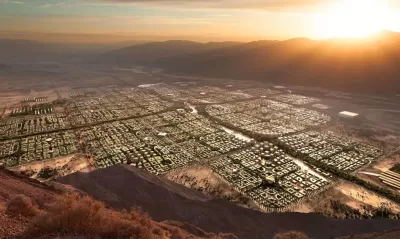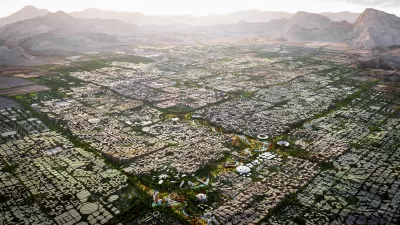Like others before him, e-commerce billionaire Marc Lore wants to build the ideal city from scratch. Urban experts don't have much faith in his chances.

Marc Lore, e-commerce founder and billionaire, has set his sights on planning a utopian community, reports Joshua Brustein. Inspired by the philosophy of 19th century economist Henry George, Lore has "come up with the modest proposal to start a private foundation, buy 200,000 acres or so of land, probably somewhere in the American West, and build a 5 million-person city from the ground up—a Georgist utopia that will serve as a demonstration project for a new, fairer phase of capitalism."
For Lore, the key would be the foundation's commitment "to take the appreciation of the land and give it back to the citizens in the form of medicine, education, affordable housing, social services." The model "mimics the way employees at startups are paid partially in stock. He says he’s planning the city much in the way he’d launch a business."
Lore is taking the project seriously: "[h]e’s hired a team that includes a transportation planner, an engineer, and an urban historian. His real estate consulting firm has narrowed the search for a site down to about six states and has even identified some specific 50,000-plus-acre parcels in Nevada—whose governor has proposed rules to encourage new cities—as potential sites." But despite his wealth, he doesn't have the funding, and he "hasn’t acquired land or water rights, precursors to undertaking the daunting task of persuading people to leave real cities for his hypothetical one," or "figured out how the foundation would operate or persuaded local officials to grant it the power it’d likely need to function."
Sarah Moser, associate professor of geography at Montreal’s McGill University, says the "tradition of trying to improve urban life by starting new cities from scratch" has a long, but largely unsuccessful history. Recent projects tend to have backing from the tech industry, whose "motivations vary from the desire to create test beds for technologies such as autonomous vehicles and citywide networks of sensors, to the Silicon Valley-esque conviction that privately owned startups are the solution to every problem." According to Alain Bertaud, former principal planner at the World Bank, brand new cities fall broadly into three categories: "libertarian attempts to escape government regulation; technocratic areas established to foster and showcase innovations; and projects seeking some novel model of collective welfare."
To Moser, projects like Lore's "are at best a distraction from the boring work of building functional cities—a particular shame at a time when places that already exist are struggling with the pandemic and the growing challenges of climate change. At worst, they end up being vehicles for private interests to extract concessions from local governments desperate for capital that could lead to economic development."
FULL STORY: The Diapers.com Guy Wants to Build a Utopian Megalopolis

Alabama: Trump Terminates Settlements for Black Communities Harmed By Raw Sewage
Trump deemed the landmark civil rights agreement “illegal DEI and environmental justice policy.”

Planetizen Federal Action Tracker
A weekly monitor of how Trump’s orders and actions are impacting planners and planning in America.

Why Should We Subsidize Public Transportation?
Many public transit agencies face financial stress due to rising costs, declining fare revenue, and declining subsidies. Transit advocates must provide a strong business case for increasing public transit funding.

Understanding Road Diets
An explainer from Momentum highlights the advantages of reducing vehicle lanes in favor of more bike, transit, and pedestrian infrastructure.

New California Law Regulates Warehouse Pollution
A new law tightens building and emissions regulations for large distribution warehouses to mitigate air pollution and traffic in surrounding communities.

Phoenix Announces Opening Date for Light Rail Extension
The South Central extension will connect South Phoenix to downtown and other major hubs starting on June 7.
Urban Design for Planners 1: Software Tools
This six-course series explores essential urban design concepts using open source software and equips planners with the tools they need to participate fully in the urban design process.
Planning for Universal Design
Learn the tools for implementing Universal Design in planning regulations.
Caltrans
Smith Gee Studio
Institute for Housing and Urban Development Studies (IHS)
City of Grandview
Harvard GSD Executive Education
Toledo-Lucas County Plan Commissions
Salt Lake City
NYU Wagner Graduate School of Public Service





























